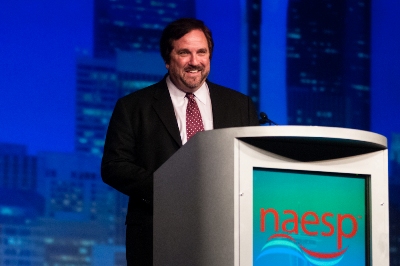Lighting Their Fires
Conference News Online
March 2012
 People from around the country and the world come to see Rafe Esquith’s fifth grade students perform Shakespeare every year. Students in his class read literary classics, compose music, learn algebra, and consistently perform in the top 5 to 10 percent of students in standardized tests. This is amazing, to be sure, but even more compelling when you hear that Esquith teaches in inner-city Los Angeles, his students are all from immigrant families, and 90 percent live below the poverty line. Hearing Esquith speak today, I don’t think I am alone in saying that while his presentation was engaging and inspiring, it was the video clips of his students that gave me goose bumps. These kids were engaged, connected, and committed in ways I certainly dream for all students in my school. Students in Esquith’s classroom are clearly learning skills and having experiences that will serve them well throughout their lives.
People from around the country and the world come to see Rafe Esquith’s fifth grade students perform Shakespeare every year. Students in his class read literary classics, compose music, learn algebra, and consistently perform in the top 5 to 10 percent of students in standardized tests. This is amazing, to be sure, but even more compelling when you hear that Esquith teaches in inner-city Los Angeles, his students are all from immigrant families, and 90 percent live below the poverty line. Hearing Esquith speak today, I don’t think I am alone in saying that while his presentation was engaging and inspiring, it was the video clips of his students that gave me goose bumps. These kids were engaged, connected, and committed in ways I certainly dream for all students in my school. Students in Esquith’s classroom are clearly learning skills and having experiences that will serve them well throughout their lives.
That’s the point, says Esquith. He urges educators to step back from the chronic focus on standardized testing that is overwhelming educators and stressing out students. Instead, Esquith maintains, schools ought to focus upon building environments of trust, helping students to become good people, and engaging students in learning that is engaging and applicable to real-life. These are the keys to the academic successes of his students. Esquith’s classroom experiences illustrate key elements of success relevant to school leaders and teachers as we evaluate practices within our own schools:
- Teach students to examine their own behavior: Esquith teaches his students about six stages of moral development. He works explicitly with students to guide the development of students’ own personal codes of behavior that motivate them to act in a fair, trustworthy, and honorable manner.
- Take risks: Esquith acknowledges that he has routinely attempted efforts that have failed or backfired, but embraces this as an essential element of the work of education. While there is an inherent danger of failure, with risk-taking comes the incredible potential to create powerful learning experiences for students. Who, after all, would have imagined his students were capable of understanding and performing Shakespearean plays that would capture the attention of so many?
- Don’t give up: Education is difficult and sometimes discouraging work. It’s hard to know that we are making a difference. Esquith shared the story of a student for whom he never knew the impact of her classroom experience with him until years later he had the opportunity to read about it in her college essay. The rewards are sometimes delayed. We don’t always have the opportunity to know how we have affected our students. Given the difficult nature of our work, Esquith urges principals and teachers to find ways to share their passions with students in their schools as a source of energy and renewal. One principal, he recalled, was an avid runner, and began a marathon club at his school. These kinds of experiences provide positive interactions that reinforce our commitment to staying engaged in this most important work.
In many ways, Esquith is an example of the “heroic-teacher-going-it-alone-against-the-odds” story that has long been prevalent in media depictions of schools. The DuFours talked about this very thing on Thursday, noting that such a mindset reinforces our notions of teaching as a solitary rather than collaborative act. While this may be true, I nevertheless found Esquith and his story to be inspiring. Reflecting upon his talk today and reading through his books, I think his example provides an interesting launching point for faculty discussions about how to foster student success. What are the conditions under which our kids will flourish? In what ways are we preparing our students for life? What matters most? How can we work together to create these conditions? These are good and appropriate questions for us to grapple with as we seek to make our schools the best they can be for all students.
Ayesha Farag-Davis, principal, Bruce M. Whittier Middle School, Poland, Maine

